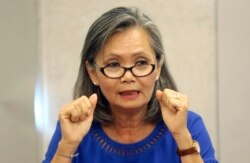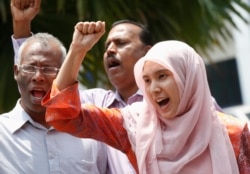Self-exiled Cambodian opposition leader Sam Rainsy, who had promised to return Saturday to Cambodia from Paris to mark the country's 66th Independence Day, landed in Malaysia Saturday, but he did not return to Cambodia, after months of speculation and escalating tensions here.
Rainsy, the acting president of the opposition Cambodia National Rescue Party, had said he would return to restore democracy in the country. He had called on Cambodian migrant workers in Thailand to join him during his planned crossing of the border from Thailand to Cambodia. The Thai government, however, has indicated it is unlikely to let Rainsy even into Thailand on “national security” concerns.
Shortly after his announcement, tensions escalated in the country, with many opposition supporters either arrested or seemingly pressured to “confess” to crimes or to openly denounce the CNRP.
Security on Saturday was heightened. During the day, hundreds of security personnel blocked the Poipet international border crossing at the Thai border, and only selectively let people in. The army was present in and around Phnom Penh airport, and traffic police reportedly carried AK-47s in the capital.
Phil Robertson, Human Rights Watch deputy Asia director, condemned the measures.
“PM Hun Sen looks foolish and paranoid by ordering thousands of police and army troops to patrol about with armored cars and heavy weapons,” he told VOA. “By doing so, he's revealing the true purpose of the security forces — to intimidate, and repress the rights and democratic aspirations of the Cambodian people.”
Rainsy arrived in the Malaysian capital, Kuala Lumpur, at about 4 p.m. Saturday, joining his deputy Mu Sochua. She had been detained at the airport on Thursday evening before being released on Friday.
Sochua did not respond to requests for comment.
Cambodia earlier this week invalidated 12 passports of opposition supporters who were abroad, including Sochua’s.
Robertson, in a media statement, called on other Association of Southeast Asian Nations countries to follow Malaysia's lead in allowing opposition activists to travel.
"Malaysia deserves kudos from around the world for letting Sam Rainsy enter the country and meet with his colleagues,” he said. “More countries in ASEAN need to emulate Malaysia going forward if the bloc is ever going to shake the moniker of being primarily a dictator's club.”
Rainsy on Thursday had been blocked from boarding a Thai Airways plane from Paris to Bangkok. He claimed the airline had received orders from the Thai government not to allow him onto the plane, while the company claims he did not hold a valid ticket.
But despite the difficulties Rainsy has faced in returning, Council of Ministers spokesman Phay Siphan said Cambodia would allow Rainsy and his supporters to enter the country. "We welcome them," he said, before adding, "We have to arrest them on the spot." Yet, Siphan said, Malaysia had indicated it did not want to interfere into Cambodia's internal affairs, and allowing opposition supporters to return to Cambodia amounted to interference into internal affairs. Malaysia was, therefore, looking for a third country to which it could relocate the opposition members, he said.
Rainsy holds dual citizenship, and according to Robertson, he entered Malaysia on his French passport.
Speaking to VOA Saturday afternoon by phone from Thailand, Pon Saory, general secretary of the CNRP overseas section, who is in close contact with Rainsy, said it was unlikely Rainsy would make it back to Cambodia that day.
“I don’t think that will happen today, but it might happen tomorrow,” he said. “It’s unpredictable and anything can happen.”
Saory said Rainsy would meet CNRP supporters in Malaysia, as well as nongovernment organizations, and try to meet Malaysian government officials.
“We are going to work out a new strategy and explore all the possible option to go [to Cambodia] together,” he said.
Rainsy has been invited by Malaysian member of Parliament Nurul Izzah Anwar to meet with the Malaysian legislator Tuesday to discuss the "best socio developmental pathways" for Malaysia and Cambodia, according to an invitation circulated on Saturday.
The United Nations Special Rapporteur on Human Rights in Cambodia Rhona Smith expressed her concerns Friday about escalating tensions in Cambodia.
“The rapid increase in numbers of arrests and serious charges filed against CNRP members is alarming,” she said in a statement.
At least 52 people had been arrested according to credible sources, the U.N. statement said, and at least 89 people have been charged with "plotting against the State."
The Trump administration, also on Friday, condemned the recent arrests and reminded Malaysia of its obligations under international law barring the return of people to face torture. Two Cambodians, including an asylum seeker, had been arrested in Malaysia and initially were set to be deported back to Cambodia, but they have for now been allowed to remain in the country.
Amnesty International called on the Cambodian authorities to “stop pressuring neighboring governments to harass, intimidate, arrest and detain Cambodian citizens with links to the outlawed political opposition.”






